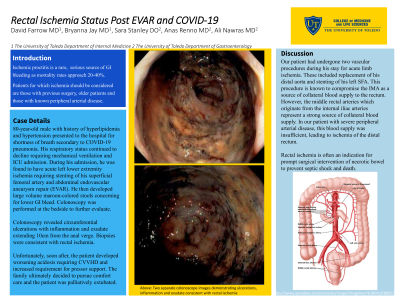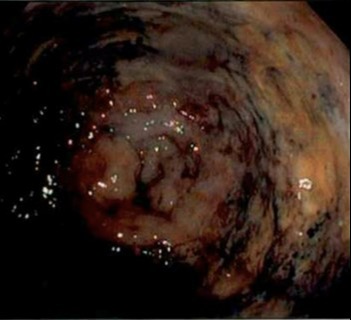Back


Poster Session B - Monday Morning
Category: Colon
B0141 - Rectal Ischemia in a Patient After EVAR and COVID-19
Monday, October 24, 2022
10:00 AM – 12:00 PM ET
Location: Crown Ballroom

Has Audio

David Farrow, MD
University of Toledo
Toledo, Ohio
Presenting Author(s)
David Farrow, MD1, Bryanna Jay, MD1, Sara Stanley, DO1, Anas Renno, MD2, Ali Nawras, MD1
1University of Toledo, Toledo, OH; 2University of Toledo Medical Center, Toledo, OH
Introduction: Ischemic proctitis is a rare, but serious, source of GI bleeding as mortality rates approach 20-40%. Patients for which ischemia should be considered are those with previous surgery, older patients, and those with known peripheral arterial disease.
Case Description/Methods: 80-year-old male with history of hyperlipidemia and hypertension presented to the hospital for shortness of breath secondary to COVID-19 pneumonia. His respiratory status continued to decline requiring mechanical ventilation and ICU admission. During his admission, he was found to have acute left lower extremity ischemia requiring stenting of his superficial femoral artery and abdominal endovascular aneurysm repair (EVAR). He was started on anticoagulation with heparin infusion.
His hospital course was further complicated large volume maroon-colored stools concerning for lower GI bleed. Colonoscopy was performed at the bedside to further evaluate. In the rectum, there were circumferential ulcerations with inflammation and exudate, extending 10cm from the anal verge. Biopsies were consistent with rectal ischemia. Unfortunately, soon after the patient developed worsening acidosis requiring CVVHD and increased requirement for pressor support. The family ultimately decided to pursue comfort care and the patient was palliatively extubated.
Discussion: Rectal ischemia is rare as the rectum has blood supply from the inferior mesenteric and bilateral iliac arteries. In our patient, during EVAR graft repair, the IMA was occluded by a stent, the iliac arteries however, remained intact providing the middle rectal and pudendal artery as sources of collateral blood supply. It is hypothesized that a hypercoagulable state caused by COVID-19 infection coupled with ongoing hypotension in the setting of critical illness in our patient with significant peripheral arterial disease led to the low flow state in bilateral iliac arteries causing ischemic proctitis. Rectal ischemia must be considered early in patients because, while most cases of lower GI bleeding can be treated conservatively, rectal ischemia is an indication for prompt surgical intervention. Surgical intervention is required to remove necrotic bowel and potential sources of infection causing septic shock.

Disclosures:
David Farrow, MD1, Bryanna Jay, MD1, Sara Stanley, DO1, Anas Renno, MD2, Ali Nawras, MD1. B0141 - Rectal Ischemia in a Patient After EVAR and COVID-19, ACG 2022 Annual Scientific Meeting Abstracts. Charlotte, NC: American College of Gastroenterology.
1University of Toledo, Toledo, OH; 2University of Toledo Medical Center, Toledo, OH
Introduction: Ischemic proctitis is a rare, but serious, source of GI bleeding as mortality rates approach 20-40%. Patients for which ischemia should be considered are those with previous surgery, older patients, and those with known peripheral arterial disease.
Case Description/Methods: 80-year-old male with history of hyperlipidemia and hypertension presented to the hospital for shortness of breath secondary to COVID-19 pneumonia. His respiratory status continued to decline requiring mechanical ventilation and ICU admission. During his admission, he was found to have acute left lower extremity ischemia requiring stenting of his superficial femoral artery and abdominal endovascular aneurysm repair (EVAR). He was started on anticoagulation with heparin infusion.
His hospital course was further complicated large volume maroon-colored stools concerning for lower GI bleed. Colonoscopy was performed at the bedside to further evaluate. In the rectum, there were circumferential ulcerations with inflammation and exudate, extending 10cm from the anal verge. Biopsies were consistent with rectal ischemia. Unfortunately, soon after the patient developed worsening acidosis requiring CVVHD and increased requirement for pressor support. The family ultimately decided to pursue comfort care and the patient was palliatively extubated.
Discussion: Rectal ischemia is rare as the rectum has blood supply from the inferior mesenteric and bilateral iliac arteries. In our patient, during EVAR graft repair, the IMA was occluded by a stent, the iliac arteries however, remained intact providing the middle rectal and pudendal artery as sources of collateral blood supply. It is hypothesized that a hypercoagulable state caused by COVID-19 infection coupled with ongoing hypotension in the setting of critical illness in our patient with significant peripheral arterial disease led to the low flow state in bilateral iliac arteries causing ischemic proctitis. Rectal ischemia must be considered early in patients because, while most cases of lower GI bleeding can be treated conservatively, rectal ischemia is an indication for prompt surgical intervention. Surgical intervention is required to remove necrotic bowel and potential sources of infection causing septic shock.

Figure: Circumferential rectal ischemia as seen by colonoscopy
Disclosures:
David Farrow indicated no relevant financial relationships.
Bryanna Jay indicated no relevant financial relationships.
Sara Stanley indicated no relevant financial relationships.
Anas Renno indicated no relevant financial relationships.
Ali Nawras indicated no relevant financial relationships.
David Farrow, MD1, Bryanna Jay, MD1, Sara Stanley, DO1, Anas Renno, MD2, Ali Nawras, MD1. B0141 - Rectal Ischemia in a Patient After EVAR and COVID-19, ACG 2022 Annual Scientific Meeting Abstracts. Charlotte, NC: American College of Gastroenterology.
